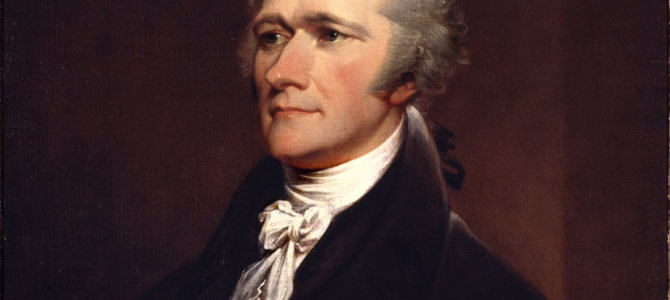
A recent essay in the Washington Post, “Hamilton Pushed for Impeachment Powers. Trump is What he Had in Mind,” proclaimed Alexander Hamilton was a major proponent of impeachment power and would have feared our president and supported his impeachment. Contrary to the essay’s claims, however, Hamilton was not a vocal proponent of impeachment power, and the historical record does not support that Hamilton would have viewed President Donald Trump as a demagogue deserving impeachment.
According to the essay, Hamilton viewed impeachment as a “crucial instrument” that he “helped design and defend.” It is true that Hamilton wrote the majority of the Federalist Papers, including the two defending the impeachment process as outlined in the Constitution.
But in drafting the Federalist Papers, Hamilton was not pushing for any particular power or check and balance; he was pushing for ratification. He was persuading the citizenry to adopt a new, more centralized and efficient form of federal government. It is an overstatement to say he pushed for impeachment power or had a major role in designing it. This may seem like a subtle nuance, but it is an important distinction.
Hamilton was not present for much of the Constitutional Convention, and when he did attend, he did not contribute much. Hamilton disagreed with many aspects of the new Constitution, but he supported its ratification because it was better than the current Articles of Confederation. The Washington Post essay provides no support for Hamilton even participating in the convention debates over whether and how to include impeachment power in the new Constitution, or distinguishing himself in any way as a champion of impeachment power.
The Essay Misuses Hamilton Quotes
In addition to overstating Hamilton’s impeachment credentials, the essay extensively misuses historical quotes. First, after briefly covering the two Federalist Papers that discussed and defended the impeachment process, the essay frames a series of Hamilton quotes as though they all discuss impeachment and would support the current impeachment efforts. But only one quote was related to impeachment. The others came from different Federalist Papers on diverse, unrelated topics.
One quote, referring to the possibility of the federal government overstepping its authority, is plucked from Federalist No. 33, “Concerning the General Power of Taxation,” expressing a fear that the newly proposed federal legislature might overstep its authority and infringe upon the state power to tax.
The essay’s reliance on another quote — “[c]aution and investigation are a necessary armor against error and imposition” — is particularly egregious as it is also lifted from a Federalist Paper concerning taxation, No. 31. The essay omits the next line: “But this untractableness may be carried too far, and may degenerate into obstinancy, perverseness, or disingenuity.”
Taken together and in context, the language shows Hamilton was suggesting to a skeptical citizenry that while it is a salutary characteristic to question governmental authority, the tendency can go too far by questioning something as basic as the power of a government to tax. The quote has absolutely nothing to do with any part of the government investigating anything, and is not related to impeachment in any manner, as the essay misleadingly portrays.
Another quote, from Federalist No. 15, “The Insufficiency of the Present Confederation to Preserve the Union,” refers to laws being meaningless if there is “no penalty annexed to disobedience.” The essay invokes the quote as evidence that Hamilton considered impeachment something not to be taken lightly but also to be used when merited. Reading the quote in context, however, shows he was referring not to the gravity of impeachment but to the need for the newly proposed federal government to have the inherent power to impose laws directly upon the states without first gaining concurrence from “thirteen distinct sovereign wills.”
Hamilton Wasn’t Talking About Trump
Second, the essay claims Hamilton “feared an unholy trinity of traits in a future president — ambition, avarice and vanity.” The historical support offered for this claim is an anonymous letter Hamilton wrote to a newspaper during our Revolutionary War. The letter criticized a congressman for using official information for personal financial gain, saying, “When avarice takes the lead in a State, it is commonly the forerunner of its fall.”
Contrary to the essay’s portrayal, Hamilton was complaining about a member of the Continental Congress, not of any president — the presidency was not even created for another decade. While Hamilton’s concern would logically extend to any official using public office to financially benefit himself, close associates, or family members, it is still confined to the context of an elected official using their office for private financial gain — in Hamilton’s words, “to turn the knowledge of secrets, to which his office gave him access, to the purpose of private profit.” Taking the language out of that context to support a proposition that Hamilton feared a “populist demagogue” president is disingenuous.
Third, the essay claims that in Federalist No. 1 Hamilton was warning against a populist demagogue. The essay relates a lengthy quote that purports to be Hamilton’s prophetic warning against the “dangerous ambition” of the worst-fear-presidential-demagogue hiding “behind the specious mask of zeal for the rights of the people.”
But the paragraph and Federalist Paper from which the quote is lifted warns not against the dangerous qualities of a potential demagogic president, but against the likely criticism from Anti-Federalists that the new Constitution was antithetical to liberty because it would establish a stronger federal government: “An enlightened zeal for the energy and efficiency of government will be stigmatized as the offspring of a temper fond of despotic power and hostile to the principles of liberty.” Hamilton was warning against the danger of an excessive zeal for liberty and democracy to the detriment of good government.
The Essay Omitted Important Context
Fourth, having taken out-of-context quotes to create Hamilton’s worst-fear-demagogue-president, the essay then conveniently omits relevant language from another Hamilton quote to bolster the belief that President Trump “embodies Hamilton’s worst fears.” The quote comes from a Hamilton letter to President George Washington, wherein Hamilton rebuts criticisms levied against his work as Treasury secretary:
When a man, unprincipled in private life[,] desperate in his fortune, bold in his temper … despotic in his ordinary demeanour — known to have scoffed in private at the principles of liberty — when such a man is seen to mount the hobby horse of popularity — to join in the cry of danger to liberty — to take every opportunity of embarrassing the General Government & bringing it under suspicion — to flatter and fall in with all the nonsense of the zealots of the day — It may justly be suspected that his object is to throw things into confusion that he may ‘ride the storm and direct the whirlwind.’
In his rant, Hamilton includes that this person was “possessed of considerable talents” and had “the advantage of military habits.” The essay omits this specific language, which is between the references to bold temper and despotic demeanor, presumably because these traits do not fit Trump nor the essay’s claim that Hamilton was providing a “prophetic” warning about him.
Read in context, the passage appears to describe a specific political opponent of Hamilton’s — maybe Aaron Burr — who was not inside government at all but could seek to incite the masses and overthrow the federal government from the outside, based in part on his “advantage of military habits.” A recent letter, “Historians on Impeachment,” published by a group of American historians, misleadingly relies on this same quote, omitting the language referencing “the advantage of military habits.”
The Essay Ignores Presidential History
In addition to overstating Hamilton’s authority on the topic of impeachment and perverting his words, the essay ignores a litany of controversial presidential acts from our nation’s history. The essay proclaims our president has displayed “behavior that would have been unimaginable during more than two centuries of the American experiment.” Really?
President John Adams signed the Alien and Sedition Acts, which gave him new powers to deport immigrants and prevent them from becoming citizens, and to punish scandalous or malicious writings against the government. He then used this power to imprison opposition newspaper editors and even a congressman. President Andrew Jackson refused to enforce a Supreme Court ruling favoring American Indians because he didn’t like it. President Abraham Lincoln unilaterally suspended the writ of habeas corpus. President Franklin D. Roosevelt forcibly incarcerated innocent Japanese immigrants and U.S. citizens of Japanese ancestry.
In more recent memory, President John F. Kennedy appointed his brother to be attorney general. President Richard Nixon oversaw the bugging of his political opponent’s headquarters. President Bill Clinton had a sexual relationship with his intern and lied under oath about it. And President Barack Obama told us one of the biggest lies in presidential history: “If you like your doctor, you can keep your doctor; if you like your plan, you can keep your plan.” Unimaginable in the American experiment? Please.
As evidence that Hamilton would have certainly hated Trump, the essay highlights the president’s conduct of — wait for it — tweeting and engaging in “inflammatory rhetoric at rallies.” Well, there you have it; Hamilton would have absolutely despised our current president — and apparently all politicians, past and present. Maybe Hamilton would have even hated himself, given that his refusal to retract some of his own inflammatory rhetoric led to the duel that cost him his life.
The essay’s unsupported assertion that Hamilton was a major proponent of impeachment power, misleading use of Hamilton’s words, and failure to address relevant U.S. history reminded me of an old quote, attributed to another historical figure: “History is nothing but a pack of tricks that we play upon the dead.” Had Voltaire lived today, he might well have used the term “fake history.”









